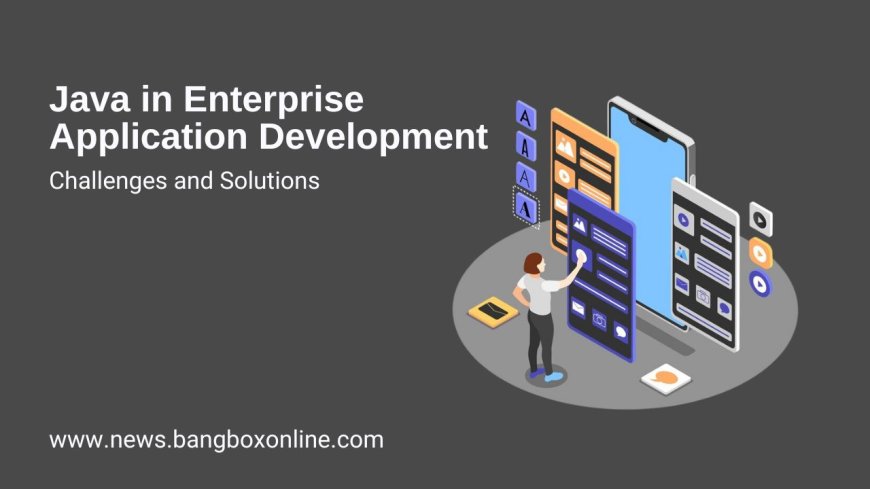Java in Enterprise Application Development: Challenges and Solutions
Discover the challenges and solutions in Java enterprise application development. Learn why hiring Java developers and outsourcing Java development can enhance your project's success.

Java has been a cornerstone in enterprise application development due to its robustness, scalability, and extensive ecosystem. However, developing enterprise applications in Java is not without its challenges. This article delves into these challenges and offers solutions, emphasizing the importance of hiring skilled Java developers and considering outsourcing Java development to address these issues effectively.
Table of Contents
-
Introduction
-
Challenges in Enterprise Java Development
-
Complexity of Enterprise Applications
-
Performance Issues
-
Security Concerns
-
Integration with Legacy Systems
-
Skill Gaps
-
Solutions for Overcoming Java Development Challenges
-
Adopting Modern Frameworks
-
Performance Optimization Techniques
-
Implementing Security Best Practices
-
Utilizing Middleware for Integration
-
Training and Upskilling Developers
-
Why Hire Java Developers
-
Benefits of Outsourcing Java Development
-
Conclusion
Introduction
Enterprise applications are essential for large organizations to manage their operations and services efficiently. Java remains a preferred choice for developing these applications due to its platform independence, scalability, and extensive libraries. However, enterprise Java development presents several challenges that need to be addressed to build robust and efficient applications.
Challenges in Enterprise Java Development
Complexity of Enterprise Applications
Enterprise applications often have complex requirements, including high availability, transaction management, and integration with various systems. Managing this complexity can be daunting, leading to increased development time and potential errors.
Performance Issues
Enterprise applications need to handle large volumes of data and high user loads. Poorly optimized Java applications can suffer from performance bottlenecks, leading to slow response times and reduced user satisfaction.
Security Concerns
Security is a critical aspect of enterprise applications. Java applications must be safeguarded against vulnerabilities like SQL injection, cross-site scripting (XSS), and data breaches. Ensuring robust security measures is a constant challenge.
Integration with Legacy Systems
Many enterprises still rely on legacy systems that need to be integrated with new Java applications. Ensuring seamless communication between old and new systems can be complex and time-consuming.
Skill Gaps
Finding skilled Java developers proficient in the latest tools and technologies can be challenging. The skill gap can hinder the development process and affect the quality of the final product.
Solutions for Overcoming Java Development Challenges
Adopting Modern Frameworks
Modern Java frameworks like Spring, Hibernate, and JavaServer Faces (JSF) simplify enterprise application development. These frameworks provide pre-built modules, reducing complexity and development time.
Performance Optimization Techniques
To address performance issues, developers should focus on efficient coding practices, use performance monitoring tools, and implement caching strategies. Regular code reviews and performance testing are also essential.
Implementing Security Best Practices
Security best practices include using secure coding standards, employing encryption, and conducting regular security audits. Developers should stay updated on the latest security threats and mitigation techniques.
Utilizing Middleware for Integration
Middleware solutions can facilitate the integration of Java applications with legacy systems. Tools like Apache Camel and MuleSoft help streamline the communication between different systems, ensuring smooth data flow.
Training and Upskilling Developers
Investing in training and upskilling programs for developers can bridge the skill gap. Encouraging continuous learning and certifications in modern Java technologies can enhance the team's capabilities.
Why Hire Java Developers
Hiring dedicated Java developers ensures that your enterprise applications are developed by experts who understand the intricacies of the language and its ecosystem. Experienced developers can deliver high-quality, secure, and scalable applications, reducing development time and costs.
Benefits of Outsourcing Java Development
Outsourcing Java development to specialized firms can offer several advantages:
-
Cost Efficiency: Outsourcing can be more cost-effective than hiring an in-house team, especially for short-term projects.
-
Access to Expertise: Outsourcing firms have experienced developers with diverse skill sets, ensuring your project benefits from their expertise.
-
Scalability: Outsourcing allows you to scale your development team up or down based on project requirements.
-
Focus on Core Business: By outsourcing development, your internal team can focus on core business activities, improving overall productivity.
Conclusion
Java continues to be a powerful tool for enterprise application development. By understanding and addressing the challenges, businesses can leverage Java's full potential to build robust, scalable, and secure applications. Hiring skilled Java developers or outsourcing development can provide the expertise needed to navigate these challenges effectively, ensuring the success of your enterprise applications.
FAQs
1. What is the role of Java in enterprise application development?
Java is crucial for enterprise applications due to its platform independence, scalability, and extensive libraries. It enables the development of robust and high-performance applications suitable for large-scale operations.
2. How can I address performance issues in Java applications?
Performance issues can be addressed by focusing on efficient coding practices, using performance monitoring tools, implementing caching strategies, and conducting regular code reviews and performance testing.
3. Why is security a concern in Java enterprise applications?
Security is critical because enterprise applications handle sensitive data. Vulnerabilities like SQL injection and cross-site scripting can lead to data breaches, so robust security measures must be implemented.
4. How can middleware help in integrating Java applications with legacy systems?
Middleware solutions like Apache Camel and MuleSoft facilitate seamless communication between Java applications and legacy systems, ensuring smooth data flow and integration.
5. What are the benefits of outsourcing Java development?
Outsourcing Java development offers cost efficiency, access to expertise, and scalability, and allows your internal team to focus on core business activities, improving overall productivity.
What's Your Reaction?
















![Noots Focus Reviews [Truth Exposed 2025]!](https://news.bangboxonline.com/uploads/images/202501/image_430x256_678e3b94881a1.jpg)
![Vivalis Male Enhancement: The Must-Know Ingredients [2025 Update]](https://news.bangboxonline.com/uploads/images/202501/image_430x256_678e3b54e396c.jpg)










